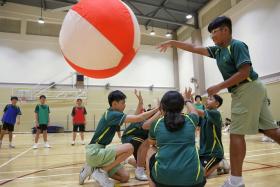Teachers need not answer messages after school hours
Teachers are not required to share their personal phone numbers, and do not need to respond to work-related messages after school hours, said Education Minister Chan Chun Sing.
Instead, teachers should use official channels like their e-mail and office number when contacting parents, and respond to work-related messages after school hours only in the event of emergencies, he said.
“Within a normal work day, if it’s not an emergency, beyond 5pm, you don’t have to answer whether your son must wear a brown or yellow t-shirt,” said Mr Chan, who was speaking at the Ministry of Education (MOE) Schools Work Plan Seminar on September 18.
The event was held at the Expo and attended by over 1,700, including teachers, school leaders and parents.
“All this is to establish boundaries, to allow educators to focus on conducting class and student activities,” said Mr Chan, “and to ensure that our educators have protected time after school hours to take care of (their) families, rest, and recharge.”
Minister of State for Education Gan Siow Huang and Senior Parliamentary Secretary for Education Shawn Huang also attended the event.
These new boundaries set for teachers are part of refreshed Guidelines for School-Home Partnership (GSHP), which will guide schools and parents on how they can “work together positively, constructively, and respectfully”, Mr Chan said.
These guidelines were developed through engagements with more than 300 teachers from May to August 2024, said MOE. Mr Chan said schools can apply these guidelines in a way that best fits their own context, in consultation with teachers and parents.
Parents should not contact teachers about things like whether their child should wear a yellow or brown shirt tomorrow, or where their spelling list is, as these should be the student’s responsibilities, he added.
“It is your job to figure it out and remember that this is part of your learning,” said Mr Chan, giving an example about how he does not check his son’s spelling list.
He defined emergencies as when the health and welfare of a child is at risk.
“We make a distinction between what’s important, and for what’s important, we will go all out, and for unimportant things, we can take our time and manage it differently,” he said, adding that a teacher’s duty of care should not overwhelm his or her duty to help the child grow.
Mr Chan announced other measures that focused on protecting teachers, reducing their workload, and improving their well-being, as well as measures that support parents.
To further protect teachers, there will be a new engagement charter, said Mr Chan, to make clear that “boorish and bullying behaviour is unacceptable”.
He added that the ministry will take firm action against individuals who threaten, insult or abuse its staff.
Teacher’s workload will also be managed, as admin work and non-teaching programmes continue to be streamlined.
Currently, teachers have had their exam administrative load reduced by 10 per cent, and invigilation load by 15 per cent, Mr Chan said, and technology will continue to be explored to reduce administrative work.
A new process will be piloted, where parents can submit their child’s medical certificates online via Parents Gateway which will go to School Cockpit Mobile, a system that provides schools with administration support, to update teachers.
The pilot will be conducted in 10 schools across the primary to pre-university levels in the first school term of 2025, and the feature will be gradually introduced to all schools by the end of 2025.
In addition, from 2026, schools can have an option to run either the Applied Learning Programme (ALP) and Learning Life Programme (LLP), or stick to running both, said Mr Chan.
The ALP and LLP are initiatives by MOE to help students learn beyond the classroom, through hands-on activities that help them contextualise what they learn in school. These could be programmes in robotics or drama, for instance.
This is to help schools free up manpower for other priorities like training for teachers, Mr Chan said, which will give teachers time to focus more on student development and imparting values beyond content knowledge.
Parents and schools should communicate with kind words, work together to role model the values for children, and support children in building connections with one another, and develop good habits, said Mr Chan.
He also introduced a set of resources, or a toolbox of strategies for parents which will include tips on creating safe home environments and managing challenges like academic anxiety and screen time limits.
A website will also be launched in Jan 2025 that will provide parents with relevant content based on their responses to questionnaires.
These are all but guidelines for the teaching fraternity, as we look at “new mindsets that we need to refresh, the new skill sets that we need to acquire”, said Mr Chan.
Parents support groups play a vital role in maintaining relationships between parents and teachers, and ensuring that boundaries are kept to, said parents.
Get The New Paper on your phone with the free TNP app. Download from the Apple App Store or Google Play Store now


